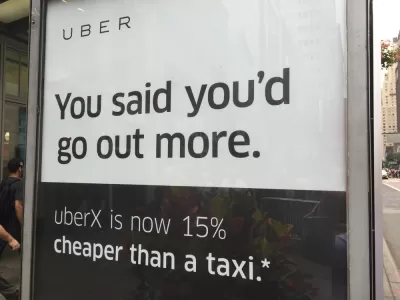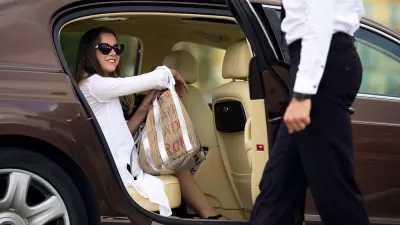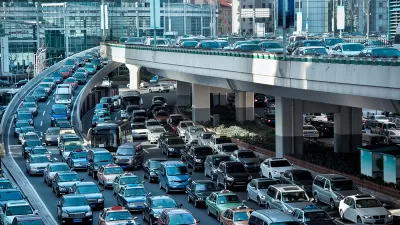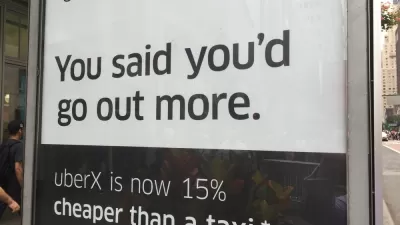New research published in Transport Policy finds that ride-hailing companies increase vehicle miles traveled of users by 97 percent in Chicago, 114 percent in New York City, and 118 percent in San Francisco.

[Updated January 27, 2020] New analysis by Schaller Consulting, published in the Transport Policy journal, quantifies the effect of ride-hailing companies on the amount of automobile travel (measured by vehicle miles traveled) by users.
Kea Wilson provides analysis of the new study, noting that the study accounts for "all the miles that drivers spent circling or heading to their pickups — aka dead-heading," in addition to the amount of time drivers spend in route to a paying customer's destination. The non-customer driving is significant: dead-heading "accounts for as much as 48 percent of the average e-taxi driver’s total mileage in some cities," according to Wilson's explanation of the report's findings.
Wilson summarizes the realities of ride-hailing, as indicated by the study's findings:
In every region in the study, the customers of transportation network companies at least doubled their total vehicle miles travelled compared to the modes they told researchers they would have taken had Uber and Lyft not been around. Schaller found collective VMT increases of a whopping 97 percent in Chicago, 114 percent in New York City, 118 percent in San Francisco, 157 percent in Boston, and 118 percent in the California suburbs.
Ride-hailing companies have the tools to limit this excess driving, however. Pooling rides, an optional service offered by the major ride-hailing companies, reduces vehicle miles traveled significantly.
As noted by Wilson, the study isn't the first to quantify the ways in which ride-hailing companies increase driving, rather than delivering reduced vehicle miles traveled as some had hoped when the business model went mainstream. A recent study showed that ride-hailing companies induce car ownership, and thus more driving. An earlier study showed that ride-hailing companies poach transit ridership.
FULL STORY: Study: Taking An App Taxi More than Doubles Your Roadway Impact

Manufactured Crisis: Losing the Nation’s Largest Source of Unsubsidized Affordable Housing
Manufactured housing communities have long been an affordable housing option for millions of people living in the U.S., but that affordability is disappearing rapidly. How did we get here?

Americans May Be Stuck — But Why?
Americans are moving a lot less than they once did, and that is a problem. While Yoni Applebaum, in his highly-publicized article Stuck, gets the reasons badly wrong, it's still important to ask: why are we moving so much less than before?

Using Old Oil and Gas Wells for Green Energy Storage
Penn State researchers have found that repurposing abandoned oil and gas wells for geothermal-assisted compressed-air energy storage can boost efficiency, reduce environmental risks, and support clean energy and job transitions.

Greening Oakland’s School Grounds
With help from community partners like the Trust for Public Land, Oakland Unified School District is turning barren, asphalt-covered schoolyards into vibrant, green spaces that support outdoor learning, play, and student well-being.

California Governor Suspends CEQA Reviews for Utilities in Fire Areas
Utility restoration efforts in areas affected by the January wildfires in Los Angeles will be exempt from environmental regulations to speed up the rebuilding of essential infrastructure.

Native American Communities Prepare to Lead on Environmental Stewardship
In the face of federal threats to public lands and conservation efforts, indigenous groups continue to model nature-centered conservation efforts.
Urban Design for Planners 1: Software Tools
This six-course series explores essential urban design concepts using open source software and equips planners with the tools they need to participate fully in the urban design process.
Planning for Universal Design
Learn the tools for implementing Universal Design in planning regulations.
Heyer Gruel & Associates PA
City of Moreno Valley
Institute for Housing and Urban Development Studies (IHS)
City of Grandview
Harvard GSD Executive Education
Salt Lake City
NYU Wagner Graduate School of Public Service
City of Cambridge, Maryland





























